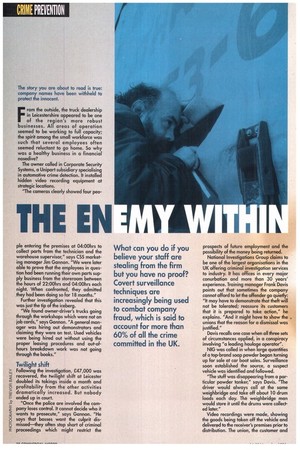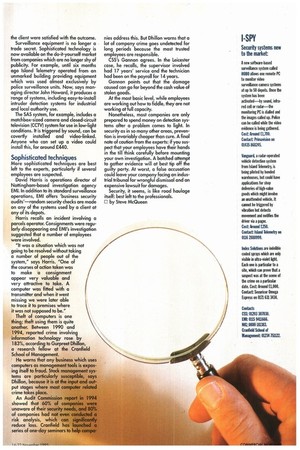CRIME PREVENTION
Page 40

Page 41

If you've noticed an error in this article please click here to report it so we can fix it.
What can you do if you believe your staff are stealing from the firm but you have no proof? Covert surveillance techniques are increasingly being used to combat company fraud, which is said to account for more than 60% of all the crime committed in the UK.
The story you are about to read is true: company names have been withheld to protect the innocent.
From the outside, the truck dealership in Leicestershire appeared to be one of the region's more robust businesses. All areas of operation seemed to be working to full capacity; the spirit among the small workforce was such that several employees often seemed reluctant to go home. So why was a healthy business in a financial nosedive?
The owner called in Corporate Security Systems, a Unipart subsidiary specialising in automotive crime detection. It installed hidden video recording equipment at strategic locations.
"The cameras clearly showed four pea pie entering the premises at 04:00hrs to collect parts from the technician and the warehouse supervisor," says CSS marketing manager Jim Gannon, "We were later able to prove that the employees in question had been running their own parts supply business from the storeroom between the hours of 22:00hrs and 04:00hrs each night. When confronted, they admitted they had been doing so for 18 months."
Further investigation revealed that this was just the tip of the iceberg. "We found owner-driver's trucks going through the workshops which were not on job cards," says Gannon. "A general manager was hiring out demonstrators and claiming they were on test. Used vehicles were being hired out without using the proper leasing procedures and out-ofhours breakdown work was not going through the books."
Twili9ht shift
Following the investigation, £47,000 was recovered, the twilight shift at Leicester doubled its takings inside a month and profitability from the other activities dramatically increased. But nobody ended up in court.
"Once the police are involved the company loses control. It cannot decide who it wants to prosecute," says Gannon. "He says that bosses want the culprit dismissed—they often stop short of criminal proceedings which might restrict the prospects of future employment and the possibility of the money being returned. National Investigations Group claims to be one of the largest organisations in the UK offering criminal investigation services to industry. It has offices in every major conurbation and more than 30 years' experience. Training manager Frank Davis points out that sometimes the company cannot afford to let the offender go quietly: "It may have to demonstrate that theft will not be tolerated; reassure its customers that it is prepared to take action," he explains. "And it might have to show the _ unions that the reason for a dismissal was justified."
Davis recalls one case when all three sets of circumstances applied, in a conspiracy involving "a leading haulage operator".
NIG was called in when large quantities of a top-brand soap powder began turning up for sale at car boot sales. Surveillance soon established the source, a suspect vehicle was identified and followed.
"The stuff was disappearing from a particular powder tanker," says Davis. "The driver would always call at the same weighbridge and take off about 10 drum loads each clay. The weighbridge man would store it until the drums were collected later."
Video recordings were made, showing the goods being taken off the vehicle and delivered to the receiver's premises prior to distribution. The union, the customer and the client were satisfied with the outcome.
Surveillance equipment is no longer a trade secret. Sophisticated technology is now available on the do-it-yourself market from companies which are no longer shy of publicity. For example, until six months ago Island Telemetry operated from an unmarked building providing equipment which was used almost exclusively by police surveillance units. Now, says managing director John Howard, it produces a range of systems, including easy-to-install intruder detection systems for industrial and local authority use.
The SAS system, for example, includes a matchbox-sized camera and closed-circuit television (CC1V) system for use in low-light conditions. It is triggered by sound, can be covertly installed and video-linked. Anyone who can set up a video could install this, for around E440.
Sophisticated techniques
More sophisticated techniques are best left to the experts, particularly if several employees are suspected.
David Harris is operations director of Nottingham-based investigation agency EMI. In addition to its standard surveillance operations, EMI offers 'business security audits'—random security checks are made on any of the systems used by a client at any of its depots.
Harris recalls an incident involving a parcels operator. Consignments were regularly disappearing and EMI's investigation suggested that a number of employees were involved.
"It was a situation which was not going to be resolved without taking a number of people out of the system," says Harris. "One of the courses of action taken was to make a consignment
appear very valuable and very attractive to take. A
computer was fitted with a transmitter and when it went missing we were later able to trace it to premises where it was not supposed to be."
Theft of computers is one thing; theft using them is quite another. Between 1990 and 1994, reported crime involving information technology rose by 183%, according to Gurpreet Dhillon, a research fellow at the Cranfield School of Management.
He warns that any business which uses computers as management tools is exposing itself to fraud. Stock management systems are particularly susceptible, says Dhillon, because it is at the input and output stages where most computer related crime takes place.
An Audit Commission report in 1994 showed that 60% of companies were unaware of their security needs, and 80% of companies had not even conducted a risk analysis, which can significantly reduce loss. Cranfield has launched a series of one-day seminars to help compa
nies address this. But Dhillon warns that a lot of company crime goes undetected for long periods because the most trusted employees are responsible.
CSS's Gannon agrees. In the Leicester case, he recalls, the supervisor involved had 17 years' service and the technician had been on the payroll for 14 years.
Gannon points out that the damage caused can go far beyond the cash value of stolen goods.
At the most basic level, while employees are working out how to fiddle, they are not working at full capacity.
Nonetheless, most companies are only prepared to spend money on detection systems after a problem comes to light. In security as in so many other areas, prevention is invariably cheaper than cure. A final note of caution from the experts: if you suspect that your employees have their hands in the till think carefully before mounting your own investigation. A botched attempt to gather evidence will at best tip off the guilty party. At worst, a false accusation could leave your company facing an industrial tribunal for wrongful dismissal and an expensive lawsuit for damages.
Security, it seems, is like road haulage itself: best left to the professionals.
n by Steve McQueen
I-SPY
Security systems new to the market:
A new software-based surveillance system called HOBO allows one remote PC to monitor video surveillance camera systems at up to 50 depots. Once the system has been activated—by sound, infrared cell or radar—the monitoring Pt is dialled and the images called up. Police can be called while the video evidence is being gathered. Cost Around £1,700. Contact Primavision on 01435 868245.
Vanguard, a radar-operated vehicle detection system from Island Telemetry, is being piloted by bonded warehouses, but could have applications for shop deliveries of high-value goods which might involve an unattended vehicle. It cannot be triggered by vibration hut detects movement and notifies the driver via a pager.
Cost Around £2511.
Contact Island Telemetry on 0116 2888999.
Intlek Solutions are indelible coded sprays which are only visible in ultra-violet light Each one is particular to a site, which can prove that a suspect was at the scene of the crime on a particular date. Cost Around £1,000. Contact Securicor Omega Express on 0171 631 3434.
Contacts
CSS: 01203 307030. EMI; 0115 9411666. MC: 0800 181383, CrarrfieW School of Management 01234 751122.




























































































































